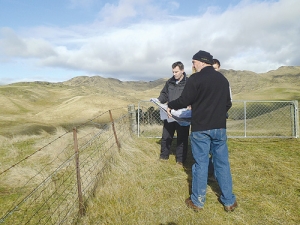New hope for high and dry irrigators
Farmers in the Hawarden basin in North Canterbury could still get an irrigation scheme by 2021, despite the failure of the Hurunui Water Project to attract enough interest to proceed.
 Hurunui Water Project director, Mike Hodgen, front, discusses the plan with advisors on a site visit to the upper Waitohi catchment. Photo: Hurunui Water Project
Hurunui Water Project director, Mike Hodgen, front, discusses the plan with advisors on a site visit to the upper Waitohi catchment. Photo: Hurunui Water Project
The Hurunui Water Project (HWP) is seeking more cash from shareholders to carry the project through to farmer sign-up and construction.
"We've got all our water and land use consents in place and the appeals process is behind us," chief executive Alex Adams says. "We now need to fund feasibility investigations to then confidently start construction."
Shareholders are called to a crucial meeting on July 27 to vote on whether to proceed. They will be asked for $900,000 in loans to fund the next phase.
"These loans will accumulate interest at competitive rates and are intended to be repaid when the water user agreements are concluded with the shareholders fortunate enough to be in the initial part of the distribution area," Adams says.
If the shareholders and other backers produce the required funds, the Government will release $3.3 million ring-fenced by Crown Irrigation Investments Ltd for the project.
"The board believes shareholder debt funding of the next stage is the most efficient way of proceeding," Adams says. "It is more cost-effective, sources money from people already invested in the success of the scheme, and will assure contractors and government that we are determined to see the scheme completed."
HWP is a $180m project to develop sustainable irrigation to drought-proof the Hurunui District's farming businesses, boost regional production, increase farm incomes and jobs, all within environmental protection rules.
Hurunui, in the heart of North Canterbury, remains gripped by a drought recently declared New Zealand's longest-lasting; this classification will run to the end of this year.
HWP says it is the first irrigation scheme in NZ to achieve its consents under the nationally agreed Water Accord and the "heightened regional council sensitivity to downstream environmental issues".
The project envisages four storage dams in the upper Waitohi River, and has consents covering 58,000ha of irrigable land in the Hawarden, Waikari, Scargill and Omihi districts with further potential in the Greta Valley, Ethelton, Glasnevin, and Amberley-Kowhai areas.
HWP says that as a piped scheme, it will encourage economic use of water and minimise the environmental impact.
Adams says a recent survey of shareholders showed that almost all of them were planning to stay with similar land use, about 50% sheep and beef and a further 30% in arable, and some deer farming.
"Most survey respondents said they intend to irrigate only a proportion of the farm," Adams says, "adding value by doing more of their own finishing of stock rather than sending them away, and taking options in specialised crops and the like.
"It is clear that for our shareholders the most important aspect of the scheme is that it will drought-proof their farms, a crucial consideration in North Canterbury."
The World Wide Sires National All Day Breeds Best Youth Camp Best All Rounder plaudit has become family affair, with 2026 Paramount Cup winner Holly Williams following in her sister Zara's footsteps.
DairyNZ is giving New Zealand farmers a unique opportunity to gain hands-on governance and leadership experience within the dairy sector.
Herd improvement company LIC has posted a 5.2% lift in half-year revenue, thanks to increasing demand for genetics.
According to the latest Fresh Produce Trend Report from United Fresh, 2026 will be a year where fruit and vegetables are shaped by cost pressures, rapid digital adoption, and a renewed focus on wellbeing at home.
The Roar is a highlight of the game hunting calendar in New Zealand, with thousands of hunters set to head for the hills to hunt male stags during March and April.
OPINION: The past few weeks have been tough on farms across the North Island: floods and storms have caused damage and disruption to families and businesses.